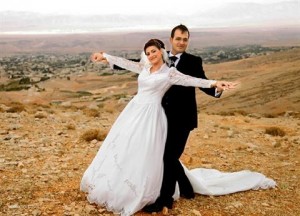 When Kholoud Sukkarieh and Nidal Darwish decided to get married last year, they never thought they would make history.
When Kholoud Sukkarieh and Nidal Darwish decided to get married last year, they never thought they would make history.
For months, Sukkarieh, a Sunni Muslim, and Darwish, a Shia Muslim, fought a legal battle. It was only last week that the country’s caretaker interior minister Marwan Charbel finally signed their marriage contract, making them the first couple in the history of Lebanon and the Arab world to get a civil marriage in their home country.
Lebanon, a small nation with more than 18 different religious sects, had no institutional civil marriage. A decree issued in 1936 by the French mandate [decree RL60], gives religious communities the legal administrative status and jurisdiction over personal status matters, including marriage.
Mixed marriages are socially and religiously discouraged and interfaith couples – such as Sukkarieh and Darwish, who do not wish to convert to one another’s religion – previously had to travel abroad to get a civil marriage. Ironically, that marriage was then recognised and registered in Lebanon.
“We were going to Cyprus to get married, when we met a lawyer who told us there was a way for us to get married in Lebanon,” said Sukkarieh.
Different legal opinions
Talal Husseini, an attorney and advocate for civil marriage, found an interpretation of the decree that facilitated Sukkarieh and Darwish’s non-religious marriage. The decree states “for those that do not belong to administratively to a religious community, the civil law applies to their personal status matters”.
Both Sukkarieh and Darwish had already struck their sects from their family registry, based on a decree issued in 2007 which allowed Lebanese citizens to remove references to their religion in state records. Thus, not belonging “administratively” to a religious community, they were eligible for civil marriage.
The couple spent many months looking for a notary that would wed them. But once they married in November, the marriage contract wasn’t automatically registered.
“This was a never-seen-before marriage,” explained Abdallah Salam, one of the couple’s legal advisers. “So the public administrator, confused, referred it to the minister of interior for approval.”
The marriage stirred nationwide debate and controversy. Lebanon’s Grand Mufti, Sheikh Mohammed Rashid Qabbani, issued a fatwa decrying civil marriage and calling for punishment of those who approved it. The Higher Shia council spoke against legalising civil marriage.
The storm around the incident came as no surprise, since Lebanon remains deeply divided along sectarian lines. Parliamentarians are elected based on their sect, public sector jobs are distributed based on sects, and religious courts remain the legal arbitrator for all personal status matters.
“The sectarian system is a source of material and political power for religious and political figures,” said Lamia Osseiran, an activist and member of the Lebanese civil centre for national initiative. “They are all benefitting from this, you take that out, they lose all their power.”
For years, civil society organisations in Lebanon, including Osseiran’s group, have been struggling to introduce optional civil marriage. But political and religious opposition always hampered their efforts.
“We need civil marriage because civil marriage is about the individual freedom of choice, and this is a right enshrined in our constitution and the human rights declaration of which Lebanon is a founder,” Osseiran told Al Jazeera. “Citizens must have the option to get married in Lebanon outside the religious establishment.”
The highest judiciary committee in Lebanon found Sukkarieh and Darwich’s marriage legal and caretaker Interior Minister Marwan Charbel, finding no legal loophole to reject it, ended up signing the contract.
Sukkarieh and Darwish now hope that their marriage will be a stepping-stone towards a secular state.
“This is a historic victory, this is a cry in the face of the sectarian regime,” said Darwish. “It is time for that regime to end, it’s time for us to move to a civic state that respects all citizens equally, regardless of their sect.”
Nation building
This first contract sets an important precedent, and effectively institutionalises civil marriage. Any Lebanese citizen who removes the “reference” to religion in their family registry can now get a non-religious marriage.
And with more people now able to bypass their religious communities, some believe that Lebanon’s sectarian administration will undergo a significant structural shift.
“You may be religious in terms of your belief, but when it comes to marriage, your relationship with the state will be a direct one without any sectarian intermediary,” said Salam.
But for advocates fighting for a secular Lebanon, the struggle is far from over. Adoption, heritage, domestic violence and other personal status matters are still governed by religious authorities – each with its own laws. Lebanon now needs to work on a civil personal status law that gives all Lebanese residents, women and men, equal rights regardless of their sect, experts say.
Raising awareness about civil marriage is a key challenge ahead, campaigners say. Many expect religious and social pressure to block couples from opting for a non-religious marriage.
“We need to explain to people that by removing reference to sect from state records, to get civil marriage, that doesn’t mean that they are not religious,” said Salam. “We also need to explain the many advantages of civil marriage, from women’s rights to financial costs, that make it desirable not just to interfaith couples.”
Sukkarieh is now four months pregnant. She says she feels proud her child is the fruit of a civil marriage, and hopes that he will one day grow up “in a secular state, where people feel they belong to a nation – and not a sect.”
Al Jazeera

Leave a Reply
You must be logged in to post a comment.